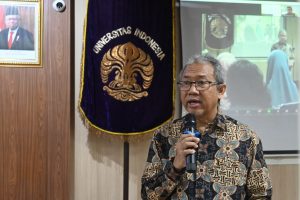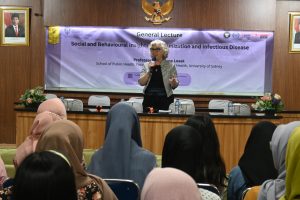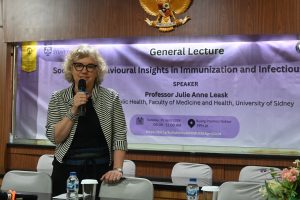
The Faculty of Public Health (FPH) Universitas Indonesia (UI) held a Hybrid General Lecture discussing the topic “Social and Behavioral Insights in Immunizations and Infectious Disease” on April 30, 2024. Presenting Professor Julie Anne Leask from the School of Public Health, Faculty of Medicine and Health, University of Sydney, this public lecture was attended by FPH UI students and lecturers.
Public lecture topics highlight the importance of understanding the social and behavioral factors that influence an individual’s decision to accept or not receive vaccination. Dean of FPH UI, Prof. Dr. Mondastri K. Sudaryo, M.S., D.Sc., was present to provide support and remarks. The presence of Professor Mondastri not only confirms FPH UI’s commitment to supporting quality scientific activities, but also adds an important dimension in the local context to the importance of social insight and behavior in efforts to prevent infectious diseases through immunization.
In his speech, Prof. Mondastri expressed his support for all efforts aimed at improving health rates both in Indonesia and globally, as well as the importance of research collaboration between researchers around the world to achieve this goal. “Modern health challenges require solutions formed through cross-sector collaboration. “FPH UI always supports positive efforts to achieve our common goals, such as reducing the number of disease cases through vaccination programs,” said Prof. Mondastri.

Professor Julie Anne explained about the use of social science to increase vaccine acceptance and related processes. The focus of his presentation was how to empower communities to make quality decisions, highlighting the importance of social science in immunization programs, and integrating social science expertise in decision making.

She also explained the factors that influence vaccine acceptance, through several aspects. First, in terms of thinking and feeling, factors such as perceived disease risk and confidence in vaccines (including perceived benefits, safety, and trust) play an important role. Furthermore, in social processes, social norms (including support from family and religious leaders) as well as recommendations from health care providers and gender equality also have a significant influence. These aspects contribute to an individual’s motivation to receive the recommended vaccine. Ultimately, people’s decisions about receiving vaccines are also influenced by practical factors such as availability, affordability, ease of access and quality of service. To strengthen vaccine acceptance, Professor Julia emphasized the importance of stages such as planning each process simply and systematically, as well as involving the community in outreach and education activities.
Not only that, but the pandemic case has also brought about significant changes and given rise to in-depth evaluation of various aspects of public health, including vaccination coverage for children. During this period, there was a decline in vaccination coverage among children. “Various factors cause some children not to receive adequate vaccinations. “Therefore, an effective approach to overcoming this problem starts with listening to the community and conducting research to understand the root of the problem,” said Professor Julie Anne. The next steps are to find solutions that suit the identified problems and carry out ongoing evaluation of the efforts made. “By understanding the reasons behind non-vaccination and identifying strategies to increase vaccine acceptance, of course we can design more effective interventions in strengthening immunization programs,” concluded Prof. Julie Anne. (DFD)
